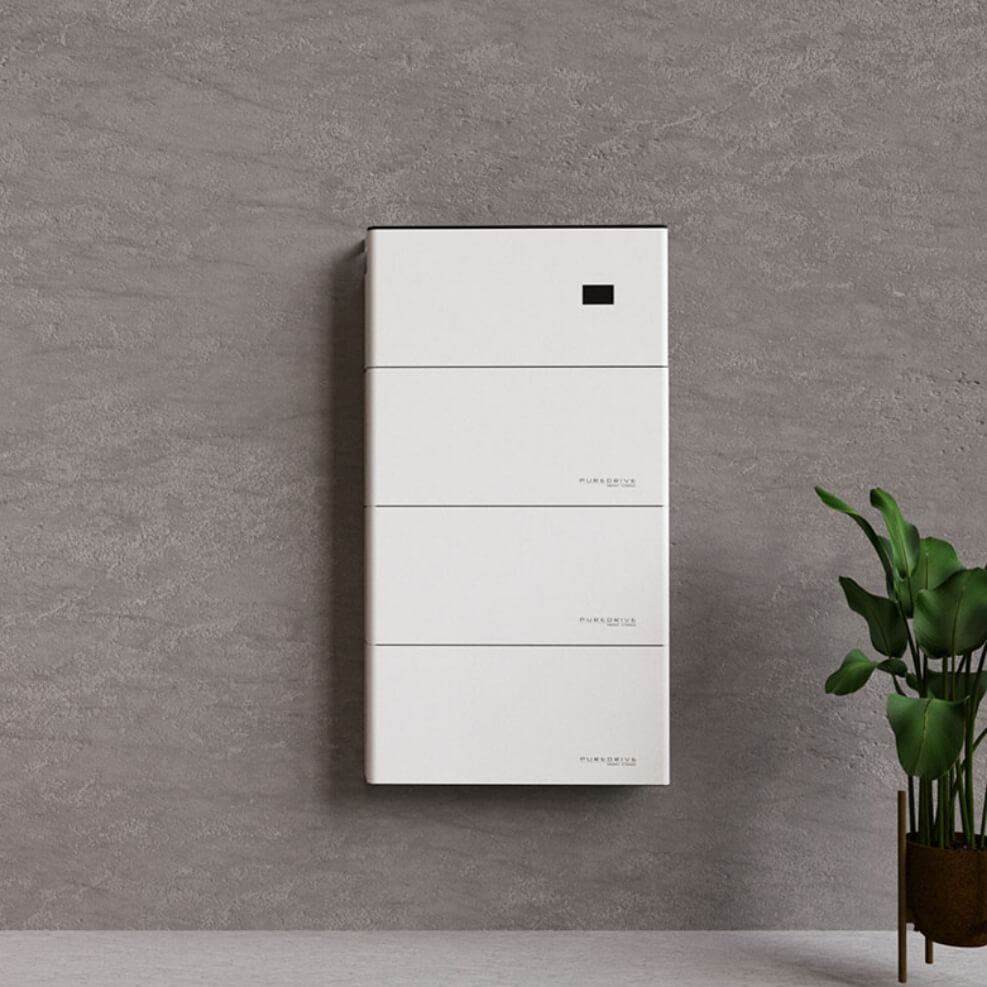The partnership of Solar PV with an Energy Storage System stands formidable strategy to unlocking a more efficient and cost-effective future.
Particularly advantageous for those with a surplus of solar energy, integrating a battery storage system is a conscious step towards reducing reliance on the national grid. This proactive approach involves self-consuming a more substantial portion of the generated energy, rather than exporting it to the grid.
These sophisticated batteries play a pivotal role in capturing surplus energy during periods of low demand, ensuring it’s available for consumption during peak times or when solar production is diminished, such as in the evenings or at night. While the initial investment for a solar system coupled with a battery is higher, the accelerated payback period underscores the financial viability of this energy solution.
What makes battery technology even more compelling is its scalability, offering a versatile solution tailored to diverse energy needs.

Energy on demand
Standalone battery storage: AC coupled systems
In some instances, the installation of a full-scale renewable energy system may not be a practical or economically viable option for homes or commercial spaces. However, the installation of standalone battery storage, particularly in the form of AC-coupled systems, offers a compelling alternative with a profound impact on energy expenses.
Even without solar panels, a standalone battery storage system, utilising AC coupling, can revolutionise how you manage your energy costs. The brilliance lies in the ability to program these batteries to charge during periods of the lowest energy costs and discharge during peak usage periods. This strategic approach ensures that you’re utilising stored energy when it’s most beneficial for your budget.
Taking it a step further, by leveraging dynamic tariffs from innovative energy providers like Octopus Energy, you gain unprecedented versatility. Your battery, with its intelligent charging capabilities, aligns with the fluctuating energy prices. In fact, in certain scenarios, you might find yourself being paid to charge your battery during periods of energy surplus on the grid. This level of adaptability not only optimises your energy consumption but also contributes to a more resilient and cost-effective energy management strategy, all without the need for traditional solar panel installations.

OPTIMISE YOUR GRID DEPENDENCY
Stand alone PV systems - no storage option
As the world increasingly embraces the shift towards sustainable energy, Solar Photovoltaic (PV) systems have emerged as powerful contributors to cleaner and greener electricity generation. While the integration of battery storage is often hailed as a complement to solar installations, there are scenarios where a standalone Solar PV system proves to be a judicious and economically sound choice.
In situations where solar excess is minimal or virtually nonexistent, justifying the expenditure on a battery storage system becomes a critical consideration. This leads us to explore the merits of installing a Solar PV system on its own, discerning when the abundant benefits of solar energy can be harnessed effectively without the need for an accompanying battery. Analysis of your premises consumption may build the rationale behind opting for a standalone Solar PV system, navigating the nuances of energy consumption and cost-effectiveness in the absence of solar excess.

Proud partner of PureDrive
UK company PureDrive provide some of the best equipment on the market.

Batteries & solar storage FAQs
Can I have home battery storage without solar panels?
Yes indeed. This is known as an AC coupled system, as there would be no DC solar element as part of this system. See our article on the differences between AC and DC coupled systems for more information.
If I move home can I take solar panels and batteries with me or do they need to stay with the property?
Yes, solar panels and batteries can certainly be taken with you when you move. Clearly there are practical considerations to this and a better solution may be to price the cost of the system into the property sale price.
Do I need a battery?
This greatly depends on the use case of your system. Batteries which are to charge only from a solar system will be dependent on the excess energy produced from the array, where excess energy is simply the quantity of energy left over once the solar panels have met the demand of the property. However, most batteries have the ability to charge from the grid. This can be a great way to save money if you have a dual rate tariff, as you can charge the battery when rates are lower and discharge when rates are higher (rather than buy energy from the grid during this period).
Can batteries be installed outside?
Absolutely. Most products on the market are rated for outside deployment. Outside locations are often one of the best locations to situate the equipment. We would also recommend that the equipment is kept under a shelter and out of direct sunlight (this is nearly always inline with manufacturers instructions).
What is the lifespan of storage batteries?
Most storage batteries have a lifespan of over 10 years, and most products come with warranties which cover the batteries for this period (commonly with unlimited cycles).
